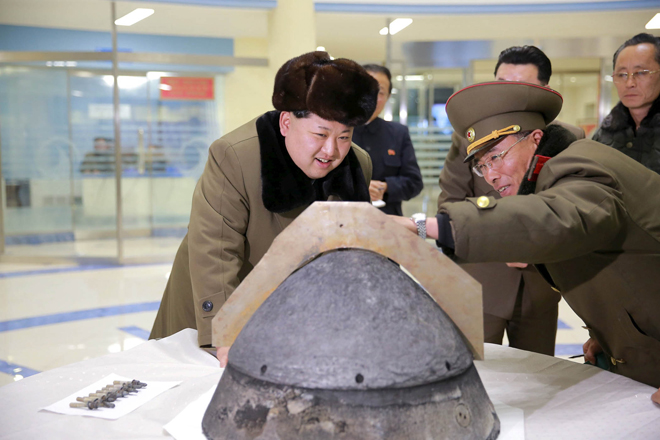North Korea latest test triggers UN Security Council talks on curbing Pyongyang’s nuclear programme

The file picture shows Kim looks at a rocket warhead tip after a simulated test of atmospheric re-entry of a ballistic missile, at an unidentified location in this undated photo released by North Korea’s Korean Central News Agency (KCNA) in Pyongyang. — Reuters photo
SEOUL: Leader Kim Jong-Un threatened US military bases across the Pacific after North Korea’s test of a powerful new missile triggered emergency UN Security Council talks late Wednesday on curbing Pyongyang’s nuclear programme.
Kim, who personally monitored Wednesday’s Musudan missile test, applauded a ‘great event’ that significantly bolstered the North’s pre-emptive nuclear attack capability, the official KCNA news agency reported.
“We have the sure capability to attack in an overall and practical way the Americans in the Pacific operation theatre,” Kim was quoted as saying.
A Korean-language version of the same report had Kim referring to ‘the American bastards.’ The Musudan has a theoretical range of anywhere between 2,500 and 4,000 kilometres, with the upper estimate covering US military bases as far away as Guam.
After a string of failures in recent months, North Korea tested two Musudans on Wednesday, one of which flew 400 kilometres into the Sea of Japan (East Sea).
KCNA said the missile had been fired at a high angle to simulate its full range, and had reached a maximum height of more than 1,400 kilometres. The test “marked an important occasion in further strengthening the nuclear attack capacity of our state,” Kim said.
The launch was condemned by the international community and the UN Security Council met for closed-door consultations on how best to respond.
France’s deputy UN ambassador Alexis Lamek, whose country holds the council presidency, told reporters after the meeting that Council members had been united in “deep concern and opposition” to the test which was a clear violation of UN resolutions. Existing UN measures prohibit North Korea from using ballistic missile technology.
The United States, Nato, Japan and South Korea also denounced the test, with US Defence Secretary Ashton Carter urging the expansion of missile defence systems in the region.
“We need to stay ahead of the threat,” Carter said. Seoul and Washington are currently in talks about deploying the advanced US THAAD missile system in South Korea – a move vehemently opposed by China.
Experts and government officials said the Musudan launch marked another worrying step forward for a weapons programme that ultimately aspires to develop an intercontinental ballistic missile (ICBM) capable of delivering a nuclear strike on the US mainland.
“We can’t deny that (North Korea’s) technological development is making progress, and the situation is alarming,” Japanese government spokesman Koichi Hagiuda told reporters. The North has publicly displayed an ICBM, called the KN-08, which uses the same engine technology as the Musudan but has never been test-fired.
Jeffrey Lewis, director of the East Asia Nonproliferation Program at the Middlebury Institute of International Studies in California, said the international community had to find a way to get Pyongyang to accept a missile test moratorium.
“If we do nothing, this ends in a successful flight test of the Musudan-based KN-08,” Lewis said.
The front and inside pages of yesterday’s edition of North Korea’s ruling party newspaper, Rodong Sinmun, were plastered with pictures of a clearly elated Kim Jong-Un watching the test and celebrating with military scientists. There were also multiple photos of the missile blasting off from a mobile launcher near the eastern port of Wonsan.
The international outcry suggests North Korea could face renewed sanctions, either on a unilateral level or from the United Nations. After Pyongyang conducted a fourth nuclear test on Jan 6, followed by a long-range rocket launch Feb 7, the Security Council adopted its most punishing sanctions yet against North Korea. Any further measures would require the support of veto-wielding permanent council member China, traditionally the North’s closest ally.
Responding to Wednesday’s launch, China’s foreign ministry had cautioned against ‘any action that may escalate tension’ and called for a resumed dialogue on Pyongyang’s nuclear drive. — AFP
